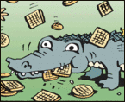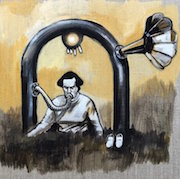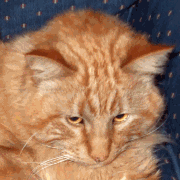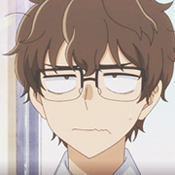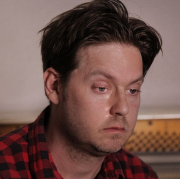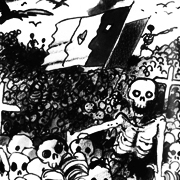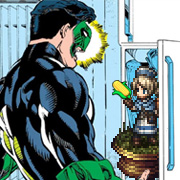|
robert browing owns completely. everyone should read childe roland to the dark tower came
|
|
|
|
|

|
| # ? Jun 5, 2024 12:30 |
|
No
|
|
|
|
Speaking of poems, old haiku are my jams. What're some good new ones?
|
|
|
|
hthis hurts me
|
|
|
|
chernobyl kinsman posted:robert browing owns completely. everyone should read childe roland to the dark tower came Isn't that a bit modern for you? Post something with a Þ in it
|
|
|
|
|
Hieronymous Alloy posted:Isn't that a bit modern for you? Post something with a Þ in it 1. Gáttir allar, áðr gangi fram, um skoðask skyli, um skyggnast skyli, því at óvíst er at vita, hvar óvinir sitja á fleti fyrir. 2. Gefendr heilir! Gestr er inn kominn, hvar skal sitja sjá? Mjök er bráðr, sá er á bröndum skal síns of freista frama. 3. Elds er þörf, þeims inn er kominn ok á kné kalinn; matar ok váða er manni þörf, þeim er hefr um fjall farit. 4. Vatns er þörf, þeim er til verðar kemr, þerru ok þjóðlaðar, góðs of æðis, ef sér geta mætti, orðs ok endrþögu. 5. Vits er þörf, þeim er víða ratar; dælt er heima hvat; at augabragði verðr, sá er ekki kann ok með snotrum sitr. 6. At hyggjandi sinni skyli-t maðr hræsinn vera, heldr gætinn at geði; þá er horskr ok þögull kemr heimisgarða til, sjaldan verðr víti vörum, því at óbrigðra vin fær maðr aldregi en mannvit mikit. 7. Inn vari gestr, er til verðar kemr, þunnu hljóði þegir, eyrum hlýðir, en augum skoðar; svá nýsisk fróðra hverr fyrir. 8. Hinn er sæll, er sér of getr lof ok líknstafi; ódælla er við þat, er maðr eiga skal annars brjóstum í.
|
|
|
|
toanoradian posted:Speaking of poems, old haiku are my jams. What're some good new ones? ferris wheel is a nice collection of modern tanka which are the superior japanese poetry form anyway
|
|
|
|
I've never read anything by Harold Bloom (except for maybe an excerpt of some Shakespearean analysis when I was getting my degree). What's a good intro?
|
|
|
|
|
probably how to read and why, or maybe the western canon
|
|
|
|
|
Bilirubin posted:Something from the bottle wake in QQCS that struck me was both a comment on Marxist vs. post-structuralist criticism and a mention Franchescanado made of a basic film criticism thread in CineD. Whereas I don't watch much film but do read I was wondering if there was a similar "how to lit crit" thread somewhere around here, or if we could post some links to help STEM ignoramuses like me out when approaching literary criticism. Kittler is fun imo
|
|
|
|
I find harold bloom infinitely inferior to erich auerbach who wrote mimesis, one of the best books of lit crit I've read, in exile from the nazis and without many of his books. Apologies for the poo poo formatting but this is the kind of work I'm talking about and it's a good introduction to Auerbach. He's above all else a generous and enthusiastic critic, you never get the sense he is merely stirring the pot and he seems basically without pettiness or resentment. His essay on 'figura' (link to pdf) is good also. Another way he's much more valuable than harold bloom as a critic is that he actually understands what's interesting about medieval literature and doesn't gloss over it as simply 'pre-Shakespeare'
|
|
|
|
Thank you for everyone's responses even if I don't reply directly I appreciated your posts pointing me to new thingsBandiet posted:You should probably check out things like "the odyssey" or "the divine comedy", but for more direct descendants, how about Robert Browning, Thomas Hardy, Gerard Manley Hopkins. CestMoi posted:Adonis gets called the arabic ts eliot a lot. obvs you've got neruda as well, borges poetry is real nice, pessoa but i think thatd mostly be reis and de campos being his inspired heteronyms given that caeiro never read poetry and is the best. marianne moore was a lady modernist. i realise im not giving translators at all here but i can't remember them. errr walcott? read omeros that's not really what you asked for but its extremely good. There's two Nerudas in the collection I'm reading ('I'm Explaining a Few Things' and Canto XII) and they are both good and 30 seconds looking at his biography has sold me on reading all his work. FilthyImp posted:Seconding Donne and Browning, though Donne is religious some of the lyrical flow just jumps off the page (and I've always loved The Flea for being so cheeky). The Eliot I particularly liked is part 5 of The Waste Land and the Yeats I particularly liked is Sailing to Byzantium. The commonality here is maybe a slightly fantastical sense of place. For example I also like Invisible Cities so far as prose goes, and while Shelley mostly does little for me I like his The Tower of Famine: The Tower of Famine posted:Amid the desolation of a city, quote:I like to boost Jean Toomer's Cane though it is a mix of prose and verse. It captures something sublime, and i think it pairs with the more known Harlem Renaissance artists like Hughes.
|
|
|
|
toanoradian posted:Can you explain what Aquinas' theory is? chernobyl kinsman posted:im being flippant, i actually don't know much about what aquinas says about aesthetics, and i probably should, so i'm gonna go read up on that and get back to you. he's mostly a theologian.    Edit: Yes, I'm buying it. Sham bam bamina! fucked around with this message at 01:23 on Mar 17, 2019 |
|
|
|
Eco did a monograph called 'Art and Beauty in the Middle Ages' which is also good. Though there's a more recent academic book called 'The Experience of Beauty in the Middle Ages' by Mary Carruthers which apparently refines what he says there but gently caress getting academic books outside of libraries
|
|
|
J_RBG posted:Eco did a monograph called 'Art and Beauty in the Middle Ages' which is also good. Though there's a more recent academic book called 'The Experience of Beauty in the Middle Ages' by Mary Carruthers which apparently refines what he says there but gently caress getting academic books outside of libraries what you don't enjoy paying 275 euros for a book? I mean the pages are clay coated!
|
|
|
|
|
Peel posted:I've read Iliad/Odyssey, Inferno and Paradise Lost, but they didn't really click with me. I think I have trouble with old poetry and writing in general Iliad/Odyssey might help if you understand that the odd repetition of phrases (Cow-Eyed Hera) were built-in to help retellings in the oral tradition. At least I think that's what I was told when initially reading selections. Inferno benefits from a cheat-sheet of some of the individuals being mentioned and a good translation that does the rhyme justice. Sometimes you're just like "who is this rear end in a top hat, some guy that threw orgies woopdido" without the extra layer of understanding their place in history. And Paradise is easier to pick up if you understand Satan is being cast in a Byronic light, as a tragic hero. Maybe that'll help move past the language issues. quote:There's two Nerudas in the collection I'm reading ('I'm Explaining a Few Things' and Canto XII) and they are both good and 30 seconds looking at his biography has sold me on reading all his work. My favorite is Poem 20. Really captures the sense of being off following lost love. quote:I'm not familiar with them - I'm not American and the survey I read, besides being brisk, focused mainly on Britain and Australia. Whitman is gangbusters and places himself and the human experience at the center of his work in an unapologetic way. [Do I contradict myself? Very well then, I contradict myself. I am large, I contain multitudes] Dickinson can be wry and overly concerned with mortality [Because I could not stop for Death - He kindly stopped for me] Both kind of make you stop and say "enough about these lofty ideas about nature and eternity, what about our experiences" quote:This rules thanks, I know almost nothing of the Harlem Renaissance but it looks like something I'd benefit from knowing more than nothing about perhaps partly by reading Jean Toomer's Cane. Cane is interesting because of Toomer's background-- vastly educated, lineage was in the upper crust of the negro community, 2nd wife was wealthy, and he himself avoided being labeled as an ethnic writer. Events later in life caused Toomer to more closely identify as African American, he would try to embody the idea that he was American foremost (so kind of an early post-racial ideology). It's an interesting proposition of wanting to be past the bias of skin color, but also giving justice and reverence to the experience.
|
|
|
|
Peel posted:Marianne Moore I don't know if I've ever heard of but looking her up now I like what I am reading so I will spend time with her so thanks. nothing better than a poem called poetry with the opening line 'i too, dislike it' imo
|
|
|
|
weird to talk about satan in paradise lost being cast in a byronic light given it was written 100 years before byron was born. anyway, it's amazing, miltons great, but its definitely not an intro to poetry text. best way to get into poetry is to obsessively read edward lear and lewis carroll until every thought is in metre and then read the sonnets and then the romantics and only then are you allowed to move on
|
|
|
|
I have found Rupi Kaur and Amanda Lovelace to be excellent gateways to great poetry
|
|
|
|
Mel Mudkiper posted:i have found
|
|
|
|
I have found the hymns of the priestess Enheduanna a superb gateway to all subsequent poetry
|
|
|
|
Mel Mudkiper posted:I have found Rupi Kaur and Amanda Lovelace to be excellent gateways to great poetry rupi kaur is a great gateway(a greatway, to be poetic) to badness
|
|
|
|
Does anyone have any recommendations with modern Korean literature? I've enjoyed what I've read of Han Kang's work (The Vegeterian and Human Acts) and I'd like to know more.
|
|
|
|
Is there a French equivalent of KJV? Whence would, for instance, Proust quote Revelations?
|
|
|
|
Boatswain posted:Is there a French equivalent of KJV? Whence would, for instance, Proust quote Revelations? Well, no single French translation has a cultural impact equivalent to the KJV. Since the 16th century there's also the added difficulty of competing Protestant and Catholic translations, with Swiss Bibles like the Segond having a lot of spread in the wider francophonie but not being read all that much in France. Liberal Catholics and more generally intellectuals in the 19th century would have read Lamennais' gospels and probably directly the Vulgate if they bothered to read the Old Testament at all. The janséniste translation of the Bible was also very influential if only because of how angry it made people for two centuries afterwards.
|
|
|
|
I have found Blake and Shelley to be excellent gateways to great poetry
|
|
|
|
Kangxi posted:Does anyone have any recommendations with modern Korean literature? I've enjoyed what I've read of Han Kang's work (The Vegeterian and Human Acts) and I'd like to know more. While not strictly Korean (Korean-American) I recently finished Pachinko by Min Jin Lee about Koreans in Japan and it was pretty good if maybe not capital L literature
|
|
|
|
lost in postation posted:Well, no single French translation has a cultural impact equivalent to the KJV. Since the 16th century there's also the added difficulty of competing Protestant and Catholic translations, with Swiss Bibles like the Segond having a lot of spread in the wider francophonie but not being read all that much in France. Liberal Catholics and more generally intellectuals in the 19th century would have read Lamennais' gospels and probably directly the Vulgate if they bothered to read the Old Testament at all. The janséniste translation of the Bible was also very influential if only because of how angry it made people for two centuries afterwards. Cheers!
|
|
|
|
Kangxi posted:Does anyone have any recommendations with modern Korean literature? I've enjoyed what I've read of Han Kang's work (The Vegeterian and Human Acts) and I'd like to know more. Please look after Mom by Shin Kyung-sook is one I read a few years ago and enjoyed. I would also second Pachinko. This year At Dusk by Hwang Sok-yong is on the Man Booker International longlist. According to my wife he was in all of her textbooks growing up, and she hates him. I live in Korea so I really don't have an excuse for not reading more Korean literature. I will fix this!
|
|
|
|
A human heart posted:rupi kaur is a great gateway(a greatway, to be poetic) to badness Rupi Kaur is, like, inspirational quotes on coffee mugs level. At best.
|
|
|
|
is it safe to assume that the fiction they chose here is actually bad https://www.nytimes.com/2018/11/29/books/review/best-books.html
|
|
|
|
ulvir posted:is it safe to assume that the fiction they chose here is actually bad https://www.nytimes.com/2018/11/29/books/review/best-books.html
|
|
|
|
ulvir posted:is it safe to assume that the fiction they chose here is actually bad https://www.nytimes.com/2018/11/29/books/review/best-books.html Asymmetry is one of the worst books I've tried to read
|
|
|
|
Can't stop chuckling at the awfulness of the nanny blurb. It's like something out of a high school newspaper.quote:We know from the outset of this unnerving cautionary tale (winner of the Goncourt Prize) that a beloved nanny has murdered the two children in her care; but what’s even more remarkable about this unconventional domestic thriller is the author’s intimate analysis of the special relationship between a mother and the person she hires to care for her offspring. Slimani writes devastating character studies, and she also raises painful themes: the forbidden desires parents project onto their nannies, racial and class tensions. In this mesmerizingly twisted novel, only one thing is clear: Loneliness can drive you crazy.
|
|
|
|
Somewhat related, I enjoyed this article about the state of american literary criticismquote:Often the attraction is the writing in the criticism. Profiles can have similar effects if written in the spirit of appreciative criticism. But writers are not famous like actors, and shouldn’t be under the burden of being as interesting as their books, and the authors of the most interesting books never will be. Most Q&As with young authors simply bend their idiom to a coded language of salesmanship. Pity them in their pantomime of likability. quote:The edifice of “books coverage” that has been constructed around the work of critics looks a lot like the coverage of television—a tissue of lists, recommendations, profiles, Q&As, online book clubs, lifestyle features, and self-promotional essays by authors of new books—an edifice so slapdash it could be blown away in a week. And if the house collapsed, nobody would miss it. Sham bam bamina! posted:Can't stop chuckling at the awfulness of the nanny blurb. It's like something out of a high school newspaper. That sounds like the most boring possible angle on child murder
|
|
|
|
J_RBG posted:That sounds like the most boring possible angle on child murder The book actually isn't bad, although it's pretty firmly middlebrow. Translating the original title (Une Chanson douce) as The Perfect Nanny seems an unbelievably bad choice though, unless there's a specific cultural reference I'm missing.
|
|
|
|
I'm reading the Automobile Club of Egypt which I think was recommended in here at one point, but just want to say it slaps. Extremely good reading so far.
|
|
|
|
J_RBG posted:Somewhat related, I enjoyed this article about the state of american literary criticism this is extremely applicable to Norwegian literary/cultural criticism as well, at least in the daily newspapers  Sham bam bamina! posted:Can't stop chuckling at the awfulness of the nanny blurb. It's like something out of a high school newspaper. yeah, the writing in that article was all levels of yikes
|
|
|
|
The Perfect Nanny is really good though Unfortunately "The Perfect Nanny" is a terrible title and makes it sound like a Lifetime Movie of the Week The original French title "Lullaby" is so much better
|
|
|
|

|
| # ? Jun 5, 2024 12:30 |
|
But seriously that blurb reminds me of when Oprah put 100 years of solitude on her book clubquote:I'm so excited to announce our first Book Club Selection of 2004! It is a HUGE book—the favorite of writers, readers, and even celebrities around the world. And I assure you, it is a reader's read!
|
|
|






